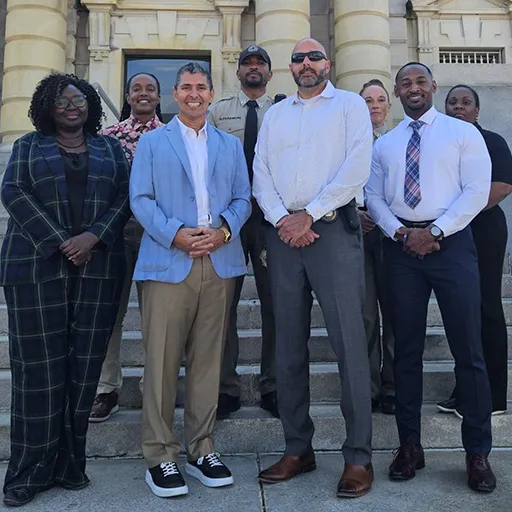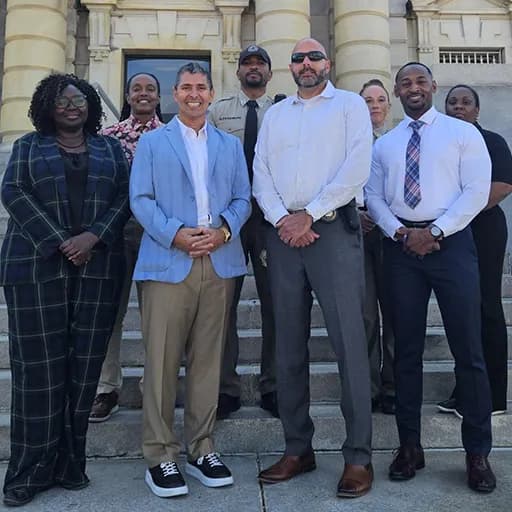
On Friday, October 17, 2025, I returned to a place that shaped the foundation of my life’s work—the federal prison in Atlanta. Once known as the United States Penitentiary (USP) Atlanta, it now operates as FCI Atlanta, part of the Bureau of Prisons’ Southeast Region.
This was no ordinary visit. In 1988, after a federal judge sentenced me to 45 years, I began my prison journey at that same facility. I arrived in chains, escorted by U.S. Marshals, uncertain of what the future would hold. Decades later, I walked through the same gates by choice—this time in slacks and a sport jacket, carrying a message of hope and preparation for success.
Gratitude and Collaboration
I am immensely grateful to Warden Tamer Abdelaziz and his exceptional team for the invitation and hospitality. Our connection began earlier this fall through conversations facilitated by Deputy Director Josh Smith. Thanks to their leadership, I had the opportunity to present to more than 200 men across two sessions, sharing lessons on accountability, education, and personal development.
I flew from Los Angeles to Atlanta on Thursday, October 16, and checked into the Gateway Marriott, conveniently located near the airport. The next morning, an Uber driver dropped me off in front of the prison at 7:05 a.m., where familiar sights brought back a flood of memories.
Remembering the Beginning
When I first entered USP Atlanta nearly four decades ago, I was determined to make the most of a difficult journey. Inspired by the books I read while in solitary confinement, I created a plan built on three principles:
- Education – to earn degrees and expand my mind.
- Contribution – to find ways to add value to others, even while confined.
- Support – to build a network of mentors and allies who believed in my growth.
Those goals became my compass through decades of imprisonment. As I climbed the prison steps this time, I thought about how far that plan had carried me—and how many others could change their lives by creating one of their own.
A Walk Down Memory Lane
Before going inside, I noticed a large display board listing the names of staff members who had retired from USP Atlanta. I looked for familiar names from the late 1980s and 1990s and found Lynn Stephens, my former supervisor. She had been instrumental in helping me begin my educational journey, showing patience, professionalism, and compassion when I needed it most. Her encouragement helped me earn university degrees and build the foundation for a career dedicated to prison reform.
Meeting the Team
At 7:15 a.m., Ms. Robertson escorted me to the Warden’s conference room, where I met Warden Abdelaziz and his entire Executive Staff. They welcomed me warmly and asked insightful questions about the work our nonprofit continues to do in collaboration with the Bureau of Prisons. After our discussion, they accompanied me to the chapel, where more than 100 men waited for the morning presentation.
Walking into that chapel was another powerful reminder of my past. It was there that Mercer University held my bachelor’s degree graduation ceremony. My sister Julie attended that event—one of the proudest moments of my incarceration. Standing in that same space decades later, speaking as a free man, filled me with gratitude and renewed purpose.
Inspiring the Next Generation
During both sessions, the men listened attentively as I shared my journey from confinement to contribution. I spoke about our ongoing advocacy to expand earned-freedom opportunities—pathways for people in prison to work toward liberty through merit. I invited participants to become ambassadors of change, documenting their growth and lowering recidivism through education, discipline, and self-improvement.
Between sessions, Warden Abdelaziz discussed some of the innovations he is bringing to FCI Atlanta. Under his leadership, the institution now publishes a prison newspaper, providing residents with opportunities to develop writing and journalism skills while strengthening morale. Even more inspiring, he’s transforming the former factory space into a reentry and training center—including a robotics program designed to prepare individuals for employment in the digital economy. These initiatives reflect the kind of forward-thinking leadership that advances rehabilitation and reentry success.
Looking Ahead
As I left the facility later that afternoon, I felt a deep sense of purpose. My journey began in chains at this same prison, but I returned by choice—to share lessons, foster partnerships, and inspire others to believe that transformation is possible.
At Prison Professors, our mission continues: to help more people in prison use their time wisely, develop self-discipline, and prepare for success upon release. Through education, documentation, and persistence, we can all play a part in building pathways to earn freedom through merit.
Key Takeaway:Returning to Atlanta reminded me that every person—no matter where they start—can write a new story. The same place that once confined me has now become a platform for purpose and reform.

